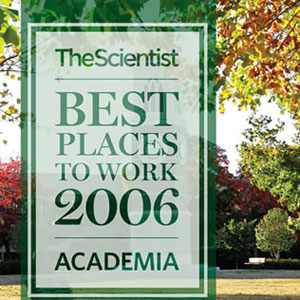 |
If you work as a scientific researcher in a Canadian university, you can├Ľt do better than Dalhousie.╠řAccording to a survey conducted by The Scientist magazine, Dalhousie╠ř was named the best non-commercial scientific institute in which to work in Canada. The Scientist, a prestigious American-based science magazine, surveyed 1,623 tenured or tenure-track life scientists working in academia or other non-commercial research organizations. They were asked to detail working conditions and environments by indicating their level of agreement with 39 criteria in╠řeight different areas.
║┌┴¤│ď╣¤═°topped the list of Canadian institutions. The University of Alberta, McMaster University, The University of British Columbia and the University of Calgary rounded out the top five.
The right mix
The magazine graded those institutions that provide balance Ð the right mix of research, teaching, and administrative responsibilities; opportunities for interaction and collaboration with colleagues; avenues for career development and advancement; availability of funding and other resources; and most importantly, freedom to follow personal research interests-that achieve the healthy and rewarding work environments that life scientists crave.
╠ř
Based in Philadelphia, PA., The Scientist is an international magazine addressing issues and events important to life scientists. It has a worldwide circulation of 75,000 subscribers.
╠ř
The ├ĺBest Places to WorkÔÇŁ survey is the cover story in the magazine├Ľs October 1st, 2006 issue.╠ř
Details of the survey and its results can also be seen on the publication├Ľs web site at:╠ř
.
Top Canadian Academic Institutions
1. ║┌┴¤│ď╣¤═°, Halifax, Nova Scotia
2. University of Alberta, Edmonton
3. McMaster University, Hamilton
4. University of British Columbia
5. University of Calgary
Most Important Factors for Canadian Academic Scientists
1. Job Satisfaction - My work gives me great personal satisfaction
2. Management & Policies - Male and female employees are treated equitably.
3. Tenure - The tenure review process has been applied fairly to different faculty members.
4. Peers - There is a high level of cooperation and collegiality among my peers.
5. Peers - I maintain good working relationships with my peers.
6. Research Resources - My institution provides an adequate research funding package for new faculty members.
7. Management & Policies - My institution provides adequate health care coverage for me and my family.
8. Tenure - The tenure system at my institution is clearly laid out for the faculty.
9. Tenure - The criteria laid out are/were applied throughout the tenure process.
10. Job Satisfaction - My teaching activities are valued by my students
┬ę 2006, The Scientist╠ř
